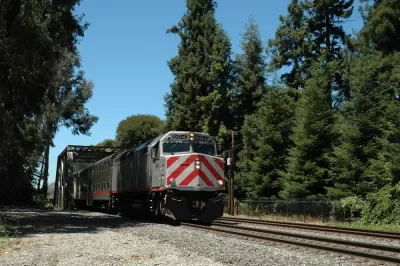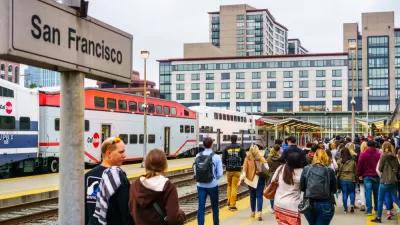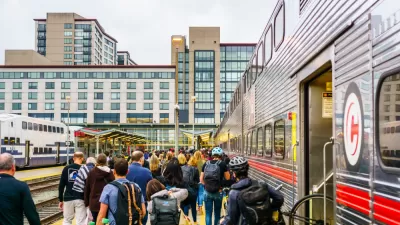Advocates are concerned about the possibility of Caltrain entirely shutting down—less than a year after the commuter rail line seemed positioned for a massive expansion of service.

"The effort to place a sales tax for Caltrain on the November ballot appears to have been dealt a fatal blow after the San Francisco Board of Supervisors Tuesday declined to support it," reports Zachary Clark.
"The move likely ensures Caltrain for the foreseeable future remains without a dedicated revenue source," explains Clark about the consequences of the decision, "intensifying fears that a systemwide shutdown is 'imminent' as the railroad struggles to stay afloat with ridership and revenue at historic lows due to the pandemic."
In August 2019, almost exactly a year ago, Caltrain officials proposed a plan that would bring Caltrain service up to BART levels—an admittedly speculative goals, but one that would meet the region's expected population growth. The plan would have required a multi-county sales tax among other sources of funding.
"San Mateo County signed off on the measure in April and, to keep it alive, the San Francisco Board of Supervisors had to introduce a resolution in support of it during a meeting Tuesday...but the board never introduced the resolution, contrary to expectations," reports Clark. The Board of Supervisors will require governance changes at Caltrain to support the tax measure.
The loss of that ambitious plan is only one concern now, however, as the region's economy, housing market, and transit ridership reacts to the coronavirus. Caltrain is currently operating on federal relief funds, but is likely to run out of money by the end of the year, according to sources cited in the article.
FULL STORY: Caltrain sales tax effort fails

Planetizen Federal Action Tracker
A weekly monitor of how Trump’s orders and actions are impacting planners and planning in America.

Maui's Vacation Rental Debate Turns Ugly
Verbal attacks, misinformation campaigns and fistfights plague a high-stakes debate to convert thousands of vacation rentals into long-term housing.

San Francisco Suspends Traffic Calming Amidst Record Deaths
Citing “a challenging fiscal landscape,” the city will cease the program on the heels of 42 traffic deaths, including 24 pedestrians.

Defunct Pittsburgh Power Plant to Become Residential Tower
A decommissioned steam heat plant will be redeveloped into almost 100 affordable housing units.

Trump Prompts Restructuring of Transportation Research Board in “Unprecedented Overreach”
The TRB has eliminated more than half of its committees including those focused on climate, equity, and cities.

Amtrak Rolls Out New Orleans to Alabama “Mardi Gras” Train
The new service will operate morning and evening departures between Mobile and New Orleans.
Urban Design for Planners 1: Software Tools
This six-course series explores essential urban design concepts using open source software and equips planners with the tools they need to participate fully in the urban design process.
Planning for Universal Design
Learn the tools for implementing Universal Design in planning regulations.
Heyer Gruel & Associates PA
JM Goldson LLC
Custer County Colorado
City of Camden Redevelopment Agency
City of Astoria
Transportation Research & Education Center (TREC) at Portland State University
Jefferson Parish Government
Camden Redevelopment Agency
City of Claremont




























